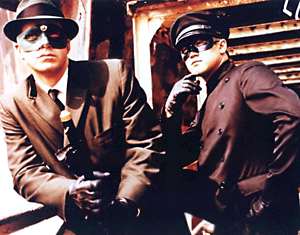The message being put forward, especially by the Right, in the aftermath of the shootings in Arizona, is that it is absurd to blame the rhetoric of violence and hatred for the actions of anyone, let alone Jared Lee Loughner. Words don’t matter. The man is a loon, his actions cannot be laid at the feet of anyone else. Taken far enough, by this reasoning he acted in complete isolation from all influences. Maybe so.
But really—words don’t matter?
In 1774, Goethe published his novel, The Sorrows of Young Werther, a seminal work in the so-called Sturm und Drang movement. It was a bestseller. Napoleon himself declared it an important work. It is intensely romantic, in many ways Gothic, and it ends with a suicide. The book had such an impact that it affected fashion, mood, language—and sparked a rash of suicides in imitation. Many young corpses were found with copies of the book on the bodies.
But words don’t matter.
Charles Dickens was so popular that upon arrival in New York for his American visit, throngs gathered on the docks demanding to know the fate of Little Nell. They were so caught up in the narrative that they suffered true anxiety over her fate.
But words don’t matter.
Salman Rushdie lived in hiding for years after publication of his novel The Satanic Verses because of the presumed blasphemy in the book. He was under death threat for writing about something that is, in fact, recorded in history and mentioned in the Koran.
But words don’t matter.
The oratory of Adolph Hitler spurred his country into a manic frenzy of conquest and murder and made many of his countrymen proud. Later, many could recall little of what Hitler actually said, but whatever it was, they knew it was true. He ordered them to burn books that might have presented an alternative argument, as most dictators ban anything written that might offer criticism of their programs. It is vital to silence the opposition, more important sometimes than anything else.
But words don’t matter.
For centuries the Catholic Church maintained an Index of forbidden books, books which they feared might turn people away from the church—which you would think, if they were right about being the only true church, could not happen.
But words don’t matter.
Attempts to ban certain books from libraries are common. Something in “those books” must, according to the arguments, be kept from people because it might do them harm. Now we see an attempt to produce a new edition of a beloved classic with a certain word expurgated, because it is a hurtful word, and some people would like to erase history and pretend that word no longer exists.
But of course, words don’t matter.
Abraham Lincoln, when he met Harriet Beecher Stowe, greeted her by saying “So you’re the little woman who wrote the book that started this great war.”
But words, of course, don’t matter.
People dedicated their lives to the cause of liberation, many after reading the Declaration of Independence, which has come to be almost a national prayer, more important to some than the constitution. The Declaration of the Rights of Man led to the overthrow of a monarch and the subsequent bloodbath that was the French Revolution.
But we all know, words don’t matter.
Daily the Supreme Court hears debate over laws and how they accord with the constitution, arguing constantly over what the words mean and what they intend and how they may be interpreted, and rights rise and fall accordingly.
Yet words don’t matter.
How many times have we heard someone say “That book changed my life!” How often has a book or a poem or a story brought us close to tears? How many characters mean more to some people than the flesh-and-blood people in their lives?
Here’s the uncomfortable truth. When a set of words results in a good thing, no one takes offense, no one dismisses it as meaningless, no one shies away from taking credit if the words were theirs. But when something bad results, suddenly words don’t matter, we can’t lay responsibility on the author or the text. Under certain circumstances, we have laws that address the negative effects of certain words—we call them libel or slander.
The problem is that we’re terrified that if we admit to the real power of words, someone might try to take them away from us, and we’ve all seen how that goes. It’s worse than the problems such actions would redress, because it shuts out the possibilities of dialogue, of wonder, of betterment, of beauty. Which is why the solution to bad words is more good words. Cast a wide net, gather in a multiplicity of words, taste them all.
If, as the Right claims, words don’t matter, attempting to distance themselves from the consequences of something like Gabrielle Giffords’ shooting, why do they hasten to label the shooter a liberal? Why bring up what he has in his own library? If words don’t matter, it would be just as telling if he had nothing but a collection of old Archie comics and a set of Oxford Companions. Words don’t matter, so what if he has a copy of The Communist Manifesto?
If words do not matter, then we should be able to say anything and see no effect at all on anyone. No one would get angry. No one would get sad, or hurt, or embarrassed, or baffled.
But no one would be enlightened or delighted or assisted or reassured or inspired, either.
Can’t have it both ways. You can’t take credit for words doing great things and then pretend they can’t do bad things.
But the only way to counter the negative effect of certain words and not destroy ourselves is to listen to other words, better words, words that tell the truth, words that aim to educate. The conversation must go on, but we have to listen. But we also have to own up to our expectations and our understanding and acknowledge that if we seek to influence with our words, sometimes that influence will go awry.
Unless, of course, words really don’t matter. Then, what is it we’re all doing?




